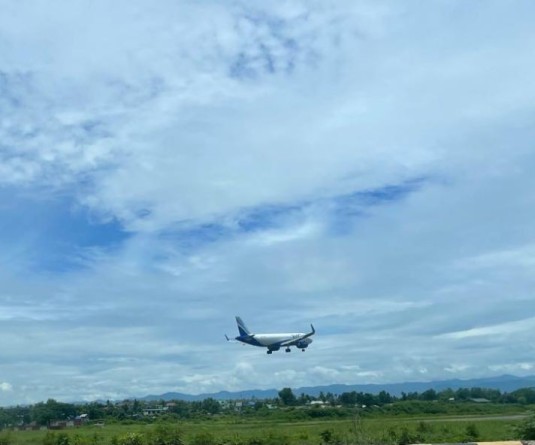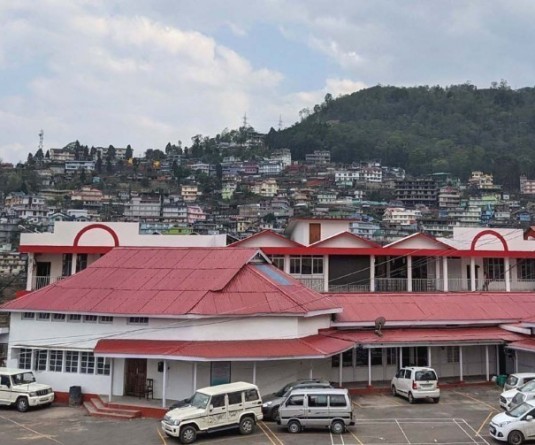A marcher holds a sign demanding the repeal of the Armed Forces Special Powers Act during the concluding programme of the two-day 'March Against AFSPA' from Dimapur to Kohima, outside Raj Bhavan Kohima, on January 11, 2022. The march was held following the Oting Killings of December 4, 2021. (Morung File Photo)
.jpg)
• AFSPA comes in the way of proceedings
• Army’s discretion to discipline soldiers or not
• Case maybe revived in the event of prosecution sanction
Morung Express News
Dimapur | September 17
The criminal proceedings against the 21 Para SF (Special Forces) soldiers accused in the Oting Killings of December 4, 2021, have come to a virtual halt. The Armed Forces Special Powers Act (AFSPA) served as the protective shield.
The Supreme Court, on September 17, upheld the two writ petitions, filed in 2022, by the wives of the accused commandos challenging the FIRs/criminal proceedings against their husbands and other Army personnel. A Special Investigation Team, instituted by the Nagaland state government, had filed charges against 30 members of the 21 Para (SF), who took part in the botched December 4 counter-insurgency operation.
The petitioners sought the court to quash the case, “and all other ancillary proceedings” against the commandos, emanating from the criminal case filed by the Nagaland Police in connection to the Oting Killings.
The request included the quashing of the initial police complaint, the findings of the Special Investigation Team (SIT), the criminal charges and any potential internal disciplinary actions by the Army. They argued that the case was initiated unfairly and “solely targeted at attacking soldiers in exercise of their bona fide duties of upholding the dignity of Indian Flag.”
The decision, delivered by a two-judge bench comprising of Justices Vikram Nath and P B Varale, cited the immunity provided by the AFSPA, and the Central government denying prosecution sanction against the accused soldiers. The SIT, which investigated the Oting Killings, had sought prosecution sanction from the Department of Military Affairs atleast twice in 2022. The Nagaland state government had also filed a writ petition in April 2024 challenging the denial of prosecution sanction.
“In view of the specific bar contained in Section 6 of the AFSP Act, 1958 which provides that no prosecution, suit, or other legal proceedings can be instituted except with the previous sanction of the Central Government with respect to the exercise of any power conferred under the said Act, the proceedings based on the impugned FIRs cannot continue any further,” the justices said in their ruling.
The ruling, however, came with a caveat. In the event, sanction of prosecution is allowed in future, the case may be revived. It said, “If ultimately at some stage, sanction is granted under Section 6 of the AFSP Act, 1958, the proceedings pursuant to the impugned FIRs are liable to be continued… according to law and may take its own course as provided under law.”
The court also rejected the state government’s request to direct the Army to initiate departmental disciplinary proceedings against the accused soldiers. The court maintained that such action is within the sole discretion of the armed forces. It said, “The said submission does not merit consideration by this Court as that would be at the sole discretion of the Armed Forces whether or not to carry on disciplinary proceedings against its officers. As such, we are not inclined to issue any such directions.
The concerned wing of the Armed Forces would be at liberty to take or not to take any disciplinary proceedings against its officers.”
Background
The Oting Killings of December 4, 2021, was the result of a botched covert counter-insurgency operation conducted by a unit of the 21 Para SF.
In the botched operation, 8 civilians travelling in a pickup were ambushed, killing 6 on the spot and critically wounding 2 others.
The victims were civilian coal miners returning home from the coal mines in Tiru valley, Mon district. The botched operation was discovered by villagers, who found the commandos in the process of concealing the dead bodies of the 6 victims. The angry villagers confronted the commandos. It turned into a deadly confrontation as 7 more civilians were gunned down. The commandos also sustained casualty, with one succumbing later.
The effect of the killings reverberated in Mon town the next day on December 5, in which a civilian protestor succumbed to firing from security personnel. The events of December 5 were not covered by the terms of reference of the SIT.





